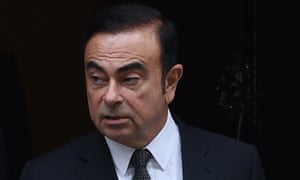Court has already rejected one bail request from ex-Nissan boss, saying he is a flight risk

Former Nissan executive Carlos Ghosn has been in detention in Japan since his arrest on 19 November.
Photograph: Facundo Arrizabalaga/EPA
Carlos Ghosn has vowed to remain in Japan in the unlikely event he is granted bail, even offering to wear an electronic ankle tag and hire security guards to track his every move as he awaits trial on financial misconduct charges.
The former Nissan chairman has been in detention since he was first arrested on 19 November in a case that has rocked Japan’s car industry and cast doubt over the future of the carmaker’s alliance with Renault.
The Tokyo district court has already turned down one bail request, believing Ghosn to be a flight risk who could tamper with evidence over allegations that he underreported his income by tens of millions of dollars and transferred personal investment losses to Nissan.
The 64-year-old, who has made just one public appearance since his arrest, has repeatedly denied the allegations.
In a statement released on Monday by his US-based representatives, Ghosn said he would “respect any and all bail conditions”.
“I remain imprisoned in the detention centre, 64 days after I was arrested, with no release in sight,” he said. “As the court considers my bail application, I want to emphasise that I will reside in Japan and respect any and all bail conditions the court concludes are warranted.
“I will attend my trial not only because I am legally obligated to do so, but because I am eager to finally have the opportunity to defend myself.
“I am not guilty of the charges against me and I look forward to defending my reputation in the courtroom; nothing is more important to me or to my family.”
The representative said Ghosn was willing to offer a higher bail fee using Nissan stock as collateral, confine himself to an apartment his family has rented in Tokyo and surrender his passport. He also vowed not to interact with anyone who could be a potential witness in his case and to report daily to prosecutors.
The Tokyo district court was due to rule on the latest bail petition on Tuesday at the earliest, according to Japan’s public broadcaster NHK. His lawyers have conceded that he is unlikely to be released before his trial begins, which may not be for another six months.
Ghosn’s prolonged detention has prompted criticism of Japan’s “hostage justice”, which allows prosecutors to rearrest suspects several times over different allegations and to question them for up to eight hours a day without a lawyer present.
Last week his wife, Carole, appealed to Human Rights Watch to highlight her husband’s ordeal, claiming he was being subjected to “draconian” treatment in detention while prosecutors attempted to secure a confession.